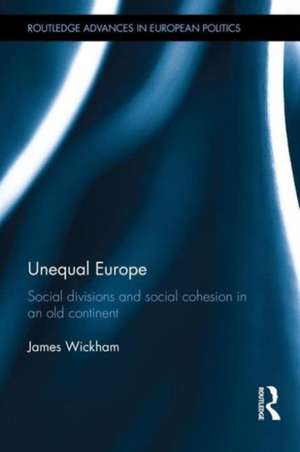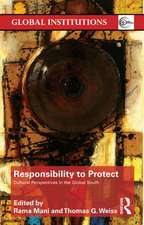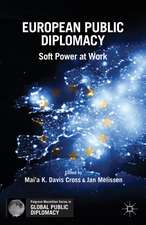Unequal Europe: Social Divisions and Social Cohesion in an Old Continent: Routledge Advances in European Politics
Autor James Wickhamen Limba Engleză Hardback – 14 mar 2016
Demonstrating the continued importance of national difference within Europe, the author argues that nonetheless the European Social Model has softened social inequalities such as those of wealth and income distribution, social class, gender and possibly even ethnicity. However these achievements are now being undermined, partially by the European Union itself. The book also challenges conventional wisdom on Europe’s alleged need for immigration and highlights the UK’s distinctiveness within Europe, explaining the country’s uneasy relation to the European project.
This book will be of great interest to students and scholars of Politics, European Societies, Social Policy and Comparative Studies.
Din seria Routledge Advances in European Politics
-
 Preț: 145.05 lei
Preț: 145.05 lei -
 Preț: 324.96 lei
Preț: 324.96 lei -
 Preț: 364.22 lei
Preț: 364.22 lei -
 Preț: 318.95 lei
Preț: 318.95 lei -
 Preț: 274.32 lei
Preț: 274.32 lei -
 Preț: 324.87 lei
Preț: 324.87 lei -
 Preț: 300.11 lei
Preț: 300.11 lei - 9%
 Preț: 1037.88 lei
Preț: 1037.88 lei - 18%
 Preț: 1112.03 lei
Preț: 1112.03 lei - 18%
 Preț: 999.64 lei
Preț: 999.64 lei - 18%
 Preț: 1058.79 lei
Preț: 1058.79 lei -
 Preț: 326.03 lei
Preț: 326.03 lei - 18%
 Preț: 1007.36 lei
Preț: 1007.36 lei - 18%
 Preț: 1060.87 lei
Preț: 1060.87 lei - 18%
 Preț: 1010.60 lei
Preț: 1010.60 lei - 18%
 Preț: 1057.61 lei
Preț: 1057.61 lei - 18%
 Preț: 1057.13 lei
Preț: 1057.13 lei - 18%
 Preț: 1055.69 lei
Preț: 1055.69 lei - 18%
 Preț: 1061.93 lei
Preț: 1061.93 lei - 18%
 Preț: 1059.93 lei
Preț: 1059.93 lei - 18%
 Preț: 998.40 lei
Preț: 998.40 lei - 18%
 Preț: 1114.64 lei
Preț: 1114.64 lei - 18%
 Preț: 1058.43 lei
Preț: 1058.43 lei - 18%
 Preț: 1112.03 lei
Preț: 1112.03 lei - 18%
 Preț: 1057.75 lei
Preț: 1057.75 lei - 18%
 Preț: 1055.21 lei
Preț: 1055.21 lei - 18%
 Preț: 1050.02 lei
Preț: 1050.02 lei - 18%
 Preț: 1001.55 lei
Preț: 1001.55 lei - 18%
 Preț: 973.89 lei
Preț: 973.89 lei -
 Preț: 393.26 lei
Preț: 393.26 lei - 18%
 Preț: 1060.25 lei
Preț: 1060.25 lei - 18%
 Preț: 706.91 lei
Preț: 706.91 lei - 18%
 Preț: 1273.35 lei
Preț: 1273.35 lei -
 Preț: 400.16 lei
Preț: 400.16 lei - 18%
 Preț: 1057.13 lei
Preț: 1057.13 lei - 18%
 Preț: 1059.93 lei
Preț: 1059.93 lei - 18%
 Preț: 1058.79 lei
Preț: 1058.79 lei - 18%
 Preț: 952.31 lei
Preț: 952.31 lei - 18%
 Preț: 1057.75 lei
Preț: 1057.75 lei - 18%
 Preț: 1054.71 lei
Preț: 1054.71 lei - 18%
 Preț: 1059.84 lei
Preț: 1059.84 lei - 28%
 Preț: 823.63 lei
Preț: 823.63 lei -
 Preț: 370.71 lei
Preț: 370.71 lei - 31%
 Preț: 765.01 lei
Preț: 765.01 lei - 18%
 Preț: 947.72 lei
Preț: 947.72 lei - 18%
 Preț: 1113.95 lei
Preț: 1113.95 lei - 20%
 Preț: 248.97 lei
Preț: 248.97 lei -
 Preț: 352.36 lei
Preț: 352.36 lei
Preț: 828.12 lei
Preț vechi: 1107.61 lei
-25% Nou
Puncte Express: 1242
Preț estimativ în valută:
158.51€ • 172.24$ • 133.24£
158.51€ • 172.24$ • 133.24£
Carte tipărită la comandă
Livrare economică 21 aprilie-05 mai
Preluare comenzi: 021 569.72.76
Specificații
ISBN-13: 9781857285512
ISBN-10: 1857285514
Pagini: 298
Ilustrații: 24 black & white illustrations, 15 black & white tables, 24 black & white line drawings
Dimensiuni: 156 x 234 x 23 mm
Greutate: 0.91 kg
Ediția:1
Editura: Taylor & Francis
Colecția Routledge
Seria Routledge Advances in European Politics
Locul publicării:Oxford, United Kingdom
ISBN-10: 1857285514
Pagini: 298
Ilustrații: 24 black & white illustrations, 15 black & white tables, 24 black & white line drawings
Dimensiuni: 156 x 234 x 23 mm
Greutate: 0.91 kg
Ediția:1
Editura: Taylor & Francis
Colecția Routledge
Seria Routledge Advances in European Politics
Locul publicării:Oxford, United Kingdom
Public țintă
General and UndergraduateCuprins
Introduction 1. Where is Europe anyway? 2. From industrial society to the knowledge-based economy 3. The political economy of contemporary European capitalism 4. Money, markets and post-modernity 5. Employment, occupations and social classes 6. Spatial Inequality: Europe of the regions 7. From labour immigration to European mobility 8. Ethnic diversity and the national welfare state 9. Gender equality and social inequality 10. Conclusion: The end of the European Social Model before it began?
Notă biografică
James Wickham leads the Working Conditions in Ireland project at the Dublin think tank Tasc. He was also Jean Monnet Professor of European Labour Market Studies and Professor in Sociology at Trinity College Dublin, Ireland.
Recenzii
'In November 1993, 28 countries, now containing over five hundred million people, joined to form the European Union (EU). People, goods, and money then moved freely within the EU. In 2002, a common currency, the euro, was introduced. Wickham, of the Dublin think tank Tasc, focuses on two issues: inequality within and between the 28 member nations, and the degree to which individuals in each nation feel that they are part of the larger EU. Summing Up: Recommended.' -D. Harper, University of Rochester, in CHOICE
Descriere
This wide-ranging and comparative text reviews the major theoretical and substantive debates on social inequality in Europe. It provides a valuable dual focus on European society and individual societies while placing Europe in its wider global context. This book will be of great interest to students and scholars of Politics, European Societies, Social Policy and Comparative Studies.















